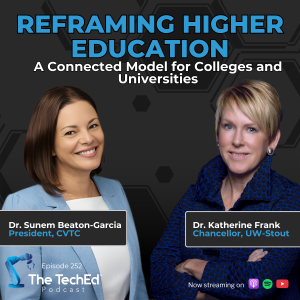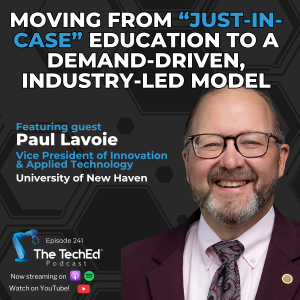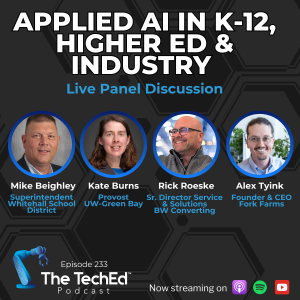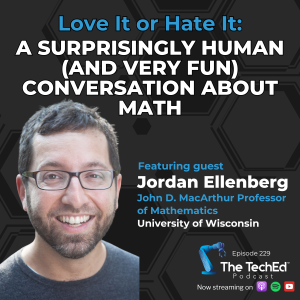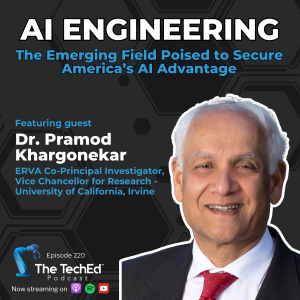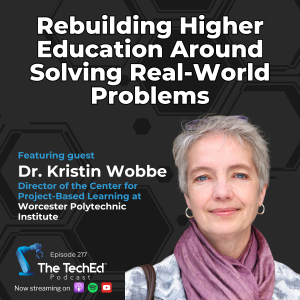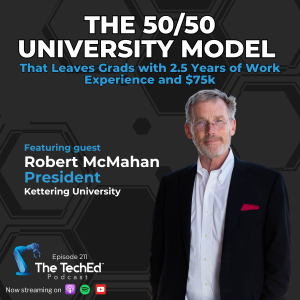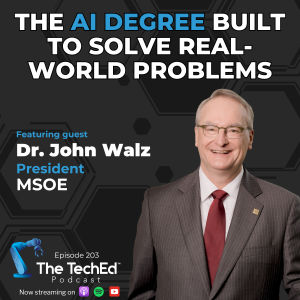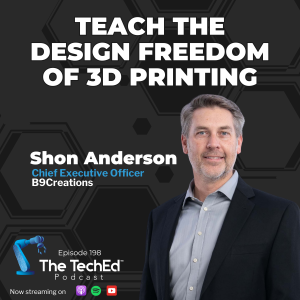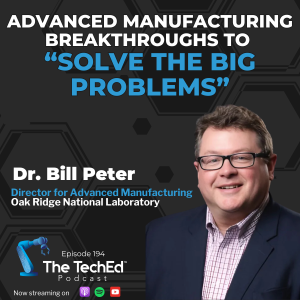Rebuilding Higher Education Around Solving Real-World Problems
Dr. Kristin Wobbe, Director of the Center for Project-Based Learning at Worcester Polytechnic Institute
What happens when a university rethinks the whole higher ed model rebuilds it around hands-on, project-based learning?
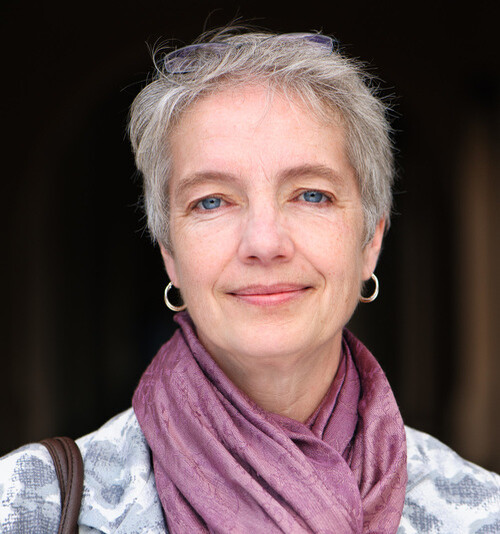 In this episode of The TechEd Podcast, Matt Kirchner dives into the bold model pioneered by Worcester Polytechnic Institute with Dr. Kristin Wobbe, Director of the Center for Project-Based Learning. A biochemist turned curriculum innovator, Kris has spent nearly two decades helping WPI embed real-world projects into every stage of a student’s education.
In this episode of The TechEd Podcast, Matt Kirchner dives into the bold model pioneered by Worcester Polytechnic Institute with Dr. Kristin Wobbe, Director of the Center for Project-Based Learning. A biochemist turned curriculum innovator, Kris has spent nearly two decades helping WPI embed real-world projects into every stage of a student’s education.
From first-year seminars on global challenges to immersive junior-year team projects with community partners around the world, WPI’s model turns students into creators, collaborators, and critical thinkers from day one.
Kris walks us through:
- The three signature projects every WPI student completes
- The surprising link between humanities and technical mastery
- How any institution—not just polytechnics—can adopt this approach
Whether you're a university leader or an instructor in search of a better way to teach, this episode offers a masterclass in how to make learning stick.
Listen to learn:
- Why students don’t need to “know everything” before they dive into hands-on learning
- How WPI redesigned its calendar and credits to prioritize deep project work
- What first-year students can accomplish when they take on global problems
- How project-based learning transforms both faculty culture and student confidence
- Why WPI students are more prepared for the workforce than their peers
3 Big Takeaways from this Episode:
1. Project-based learning works best when it starts early and is embedded across the entire student journey.
At WPI, students can opt into the Great Problems Seminar in their first year—a two-course sequence that explores global issues like food security, energy, and AI through interdisciplinary teamwork. By senior year, every student must complete a Major Qualifying Project worth three full courses, often in partnership with faculty or industry, making project-based learning a requirement, not an add-on.
2. The humanities directly enhance technical learning and student outcomes.
WPI’s alumni data shows students who complete their humanities and arts curriculum earlier perform better in technical coursework later on. These experiences sharpen communication, interdisciplinary research, and critical thinking skills—essential for identifying problems worth solving and communicating solutions effectively in STEM fields.
3. Project-based learning is scalable far beyond polytechnic institutions.
Through WPI’s Center for Project-Based Learning, Kris and her team have supported schools ranging from the Air Force Academy to community colleges and liberal arts institutions like the New England Conservatory of Music. With 85% of WPI faculty incorporating projects into their courses—and over half of student work now project-based—the model proves adaptable across disciplines, schedules, and resource levels.
Resources in this Episode:
To learn more about the Center for Project-Based Learning at Worcester Polytechnic Institute, visit: https://wp.wpi.edu/projectbasedlearning/
Other resources:
- The project-based learning philosophy of WPI
- Read Kris's book, Project-Based Learning in the First Year: Beyond All Expectations
Connect with the WPI on Social Media:
You might also like...
What our listeners are saying
The #1 podcast in TechEd
This podcast is a great resource to keep up with all the exciting changes in the world of manufacturing and technology. Get key insight from industry leaders from the Midwest and around the globe that you won’t find anywhere else. A must listen for anyone interested in how technology is changing the way businesses operate.
The pulse of Industry 4.0
This podcast has its fingers on the pulse of Industry 4.0, and Matt K. is a phenomenal guide, traversing the complexities of manufacturing and education in one forum. A+ work all around!
Compelling
I find Matt's approach to be very compelling. He brings both perspectives, industry AND education. He doesn't hold back on what he thinks is important...
New and Exciting Content With Every Episode
I really enjoy listening to this podcast when I'm driving or have a free moment. Each episode brings a new guest with a fresh and exciting perspective of both education and the workforce!
I needed this podcast back when I was in High School!
Such great content that deserves more attention at all level of education. I wish I heard some of these episodes when I was navigating my own career path. Incredible guests, with incredible messages to share. Keep up the great work!
Inspiring topics featuring inspiring leaders
I’ve listened to most of your weekly podcasts and enjoy listening to the stories and conversations that feature business and education leaders from Wisconsin. Kudos to you for creating a platform that presents ideas and success stories that are important to Career and Technical Education teachers and leaders.
Best Career and TechEd Podcast
There are a lot of education podcasts out there. This is the only one that really focuses on bringing together voices from inside AND outside education and focuses specifically on STEM and Career/Tech Ed. This is a great podcast for anyone in education and also for anyone who employs STEM or skilled-trades talent in their workforce.
Filling in Gaps
This show spotlights a large and growing aspect of education that doesn’t get enough attention. Practical and technical education is a field growing exponentially. This podcast Highlights many of the facets of this diverse field.
Fantastic Topics on the Future of Industry
These podcasts are the best for learning about current and future technology. The stories are great. We need more of these interviews.
